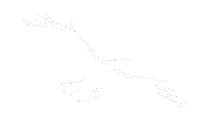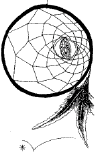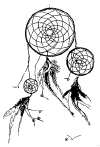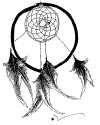The Soul of the Indian
Eastman, Charles Alexander (1911)
The father of Little Crow, the chief who led the
"Minnesota massacre" of 1862, was another prophet of some note. One of his
characteristic prophecies was made only a few years before he died, when he
had declared that, although already an old man, he would go once more upon
the war-path. At the final war-feast, he declared that three of the enemy
would be slain, but he showed great distress and reluctance in foretelling
that he would lose two of his own men. Three of the Ojibways were indeed
slain as he had said, but in the battle the old war prophet lost both of his
two sons.
There are many trustworthy men, and men of Christian
faith, to vouch for these and similar events occurring foretold. I cannot
pretend to explain them, but I know that our people possessed remarkable
powers of concentration and abstraction. I sometimes fancy that such
nearness to nature as I have described keeps the spirit sensitive to
impressions not commonly felt, and in touch with the unseen powers. Some of
us seemed to have a peculiar intuition for the locality of a grave, which
they explained by saying they had received a communication from the spirit
of the departed. My own grandmother was one of these, and as far back as I
can remember, when camping in a strange country, my brother and I would
search for and find human bones at the spot she had indicated to us as an
ancient burial-place or the spot where a lone warrior had fallen. Of course,
the outward signs of burial had been long since obliterated.
The Scotch would certainly have declared that she had the
"second sight," for she had other remarkable premonitions or intuitions
within my own recollection. I have heard her speak of a peculiar sensation
in the breast, by which, as she said, she was advised of anything of
importance concerning her absent children. Other native women have claimed a
similar monitor, but I never heard of one who could interpret with such
accuracy. We were once camping on Lake Manitoba we received news that my
uncle and his family had been murdered several weeks before, at a fort some
two hundred miles distant. While all our clan were wailing mourning their
loss, my grandmother calmly bade them cease, saying that her son was
approaching that they would see him shortly. Although we had no other reason
to doubt the ill tidings, it is a fact that my uncle came into camp two days
after his reported death.
At another time, when I was fourteen years old, we had
just left Fort Ellis on the Assiniboine River, and my youngest uncle had
selected a fine spot for our night camp. It was already after sundown, but
my grandmother became unaccountably nervous, and positively refused to pitch
her tent. So we reluctantly went on down the river, and camped after dark at
a secluded place. The next day we learned that a family who were following
close behind had stopped at the place first selected by my uncle, but were
surprised in the night by a roving war-party, and massacred to a man. This
incident made a great impression upon our people.
Many of the Indians believed that one may be born more
than once, and there were some who claimed to have full knowledge of a
former incarnation. There were also those who held converse with a "twin
spirit," who had been born into another tribe or race. There was a
well-known Sioux war-prophet who lived in the middle of the last century, so
that he is still remembered by the old men of his band. After he had reached
middle age, he declared that he had a spirit brother among the Ojibways, the
ancestral enemies of the Sioux. He even named the band to which his brother
belonged, and said that he also was a war-prophet among his people.
Upon one of their hunts along the border between the two
tribes, the Sioux leader one evening called his warriors together, and
solemnly declared to them that they were about to meet a like band of
Ojibway hunters, led by his spirit twin. Since this was to be their first
meeting since they were born as strangers, he earnestly begged the young men
to resist the temptation to join battle with their tribal foes.
"You will know him at once," the prophet said to them,
"for he will not only look like me in face and form, but he will display the
same totem, and even sing my war songs!"
They sent out scouts, who soon returned with news of the
approaching party. Then the leading men started with their peace-pipe for
the Ojibway camp, and when they were near at hand they fired three distinct
volleys, a signal of their desire for a peaceful meeting.
The response came in like manner, and they entered the
camp, with the peace-pipe in the hands of the prophet.
Lo, the stranger prophet advanced to meet them, and the
people were greatly struck with the resemblance between the two men, who met
and embraced one another with unusual fervor.
It was quickly agreed by both parties that they should
camp together for several days, and one evening the Sioux made a "warriors'
feast" to which they invited many of the Ojibways. The prophet asked his
twin brother to sing one of his sacred songs, and behold! it was the very
song that he himself was wont to sing. This proved to the warriors beyond
doubt or cavil the claims of their seer.
Such are the beliefs in which I was reared -- the secret
ideals which have nourished in the American Indian a unique character among
the peoples of the earth. Its simplicity, its reverence, its bravery and
uprightness must be left to make their own appeal to the American of to-day,
who is the inheritor of our homes, our names, and our traditions. Since
there is nothing left us but remembrance, at least let that remembrance be
just!
THE
GREAT MYSTERY -
2
THE FAMILY ALTAR -
2
CEREMONIAL AND SYMBOLIC WORSHIP
-
2
BARBARISM AND THE MORAL CODE
-
2
UNWRITTEN SCRIPTURES
-
2
ON THE BORDERLAND OF SPIRITS
-
2
White Eagle Soaring: Dream Dancer of the 7th Fire







 Get
a course to promote your business online, explode your sales
Get
a course to promote your business online, explode your sales Get
software to promote your business online in less time
Get
software to promote your business online in less time Get
software to streamline your business and run it hands free.
Get
software to streamline your business and run it hands free.